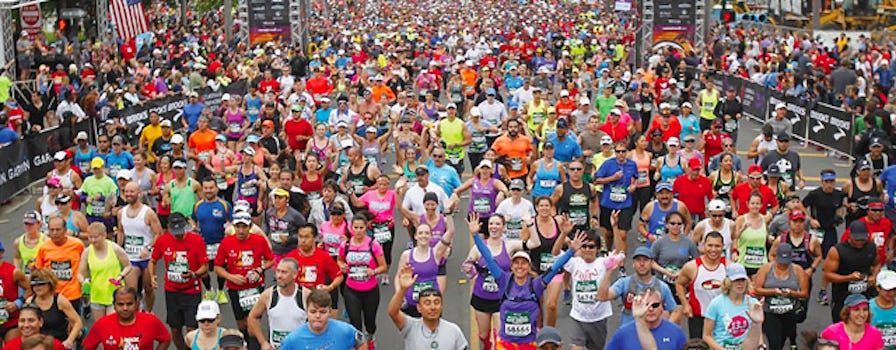The Impact of COVID-19 on Endurance Sports
Fear is on our side. Seriously. It's gonna help us.
Code Blue: Denied
I was lucky enough to check out the magic of the Cowtown Marathon in Fort Worth, Texas this past February. They host a pretty special experience.
Granted, I’m not writing this to talk about pre-COVID experiences, but bear with me for a minute.
During Saturday’s races they had a Code Blue. Just a few meters short of the finish line, a participant went into cardiac arrest. He collapsed on the ground. His heart stopped beating. It was bad.
However, thanks to the rapid response of Cowtown’s medical crew, and an AED close by, the participant was brought back to life. Within seconds a tragic headline was replaced with a heartwarming success story.
Here’s the thing… the weather that day was high-50s and slightly overcast. Perfect running conditions. Oh, and the participant was only running a 5k. And he was in his mid-30s.
A Post-COVID World
According to everything I’m reading, we haven’t yet hit the peak of coronamania in the United States. Though it’s critically important that we address the current issues in the current moment, it sure doesn’t hurt to consider what will change in the future.
As I talk with event organizers and ask them what changes they think they’ll need to make as a result of this pandemic, I’ve heard a few different ideas.
One common response is the change to on-course fuel stations. Volunteers will most likely be required to wear latex gloves. There will probably be less open containers and more of a push for participants to carry their own fluids.
Another idea I’ve heard a few times is staggered start times. Instead of mass starts, events may begin to have only a few people start every few seconds in order to spread out the crowds.
An iteration of that concept is increasing the number of starting corrals. Instead of putting thousands of people in any given start time, perhaps events may reduce each corral to a few hundred — thereby gaining additional social distance.
I’m sure there are more ideas out there. I don’t pretend to be an event ops person so I won’t get into any specific ideas of my own, but I’m open to hearing any other thoughts you may have.
Either way, none of the ideas above address a bigger question around health and safety:
What if there are long-term, negative health effects for those who had COVID-19?
The Health Risk Undefined
The truth is that we don’t yet know if there are long-term effects of COVID-19. There is a lot of speculation, but it’s too early to have a lot of facts.
Will it mutate and come back as COVID-21 to try and destroy humanity like a microscopic version of Transformers meets Fantastic Voyage? I sure hope not. I didn’t particularly like either of those movies. Instead, I choose to believe this: bit.ly/3aOxfPT
More importantly, an article just came out about COVID-19 patients potentially being impacted by lung and heart damage (check it out here: bit.ly/COVIDheart)
I’m no medical professional (though my 7 y/o daughter often pretends she has a night-time job as a nurse), but it seems to me that cardiac damage to hundreds of thousands of people in the US could have a negative impact on participation in endurance activities.
Call me crazy.
What Now?
Let’s take this conversation back to the Cowtown experience I mentioned up top. That was one person, in good weather, running a 5k, who had a cardiac event on course.
What’s going to happen when the distance is longer? When the weather is significantly more hot? Or more cold?
What’s going to change if there are guaranteed to be more people in an event with existing cardiac damage? When incidents are more likely to happen anywhere on the course?
What happens if more people start dying at endurance events because of this?
Seeking a Solution to Post-COVID-19
The IIRM (International Institute for Running Medicine) is an organization dedicated to the health and safety of participants in endurance events. The members consist of medical directors for some of the most well known events and endurance companies in the world, including TCS New York City Marathon, Marine Corps Marathon, Boston Marathon, Ironman, Bank of America Chicago Marathon and many others.
Driven by it’s Executive Director, Chris Troyanos (Boston Marathon), the IIRM recently released a statement indicating their commitment to study the long-term effects of COVID-19 as it relates to the health and safety of participants in all endurance events.
I’d say that’s a good thing.
Fear Is On Our Side
I don’t mean to freak anybody out.
Actually, I guess I kinda do. Because fear is an engine for change.
Fear drives innovation. Fear creates new ways to address challenging situations. And you can slap my bottom and call my Bertha if we’re not in a challenging situation right now.
I’m not sure what’s going to happen in the future any more than anybody else can predict, but I do know that there’s going to be a new normal — at least for awhile. And I do think it’s our responsibility to explore the potential consequences.
So let’s explore, shall we?


